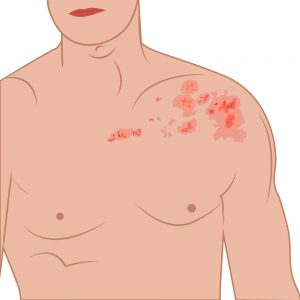In Pfizer and BioNTech’s third mRNA collaboration, both firms aim to develop an improved vaccine for shingles using their respective technologies.
BioNTech and Pfizer first partnered on infectious diseases in 2018, teaming up to develop a messenger RNA (mRNA) based influenza vaccine. However, it was their second collaboration BNT162b2 (Comirnaty) that saw success, becoming the first mRNA COVID-19 vaccine to receive emergency use approval in December 2020.
Now, both firms have teamed up again to produce a vaccine for shingles (herpes zoster) using BioNTech’s proprietary mRNA technology and Pfizer’s antigen technology.
Shingles is a chronic form of the varicella zoster virus (VZV), which affects around one in three people in the US during their lifetime. The infection can cause an extremely painful rash, and in rare conditions it can lead to deafness, blindness, and facial paralysis.
“The collaboration aims to develop a new mRNA-based vaccine against shingles, leveraging the expertise and resources of both companies,” said Ugur Sahin CEO of BioNTech.
“Adults aged 50 years and older as well as vulnerable populations like cancer patients are at an increased risk of shingles. Our goal is to develop an mRNA vaccine with a favorable safety profile and high efficacy, which is at the same time more easily scalable to support global access.”
Under the terms of the deal, the parties will share development costs but BioNTech will receive an upfront payment of $225 million, including a cash payment of $75 million and a $150 million equity investment.
The German firm will also be entitled to receive future commercialization and sales milestone payments of up to $200 million and Pfizer will collect an upfront payment of $25 million from BioNTech for use of its proprietary antigen sequences.
Clinical trials are expected to start during the second half of 2022.
Demand for shingles vax
Two vaccines have been approved to treat shingles: GlaxoSmithKline’s (GSK) Shingrix and Merck & Co.’s Zostavax.
However, Pfizer and BioNTech say there is room to develop an improved vaccine that has the potential to produce higher efficacy and better tolerability using mRNA technology.
The demand for GSK’s non-live, recombinant subunit vaccine for the prevention of shingles, Shingrix has continued to outstrip supply. The firm reported Shingrix vaccine sales in 2020 totalled £2 billion ($2.7 billion), up 10% on the previous year.
However, in May 2021 GSK reported that Shingrix sales declined by 47% due to the coronavirus pandemic and rapid rollout of COVID vaccines in the US. The firm said it remains positive that the demand for Shingrix will bounce-back with encouraging market research suggesting that eligible adults are willing to return for their Shingrix vaccine within one to three months after their COVID-19 jab.
Meanwhile, Zostavax – which has a lower efficacy rate than Shingrix – was removed from the US market by Merck in November 2020.

